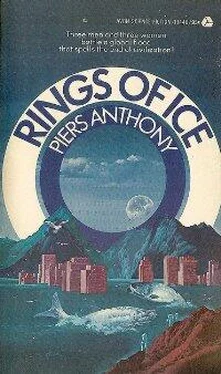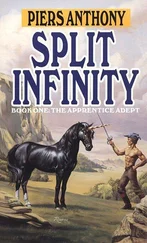“That took guts,” she said.
He did not pretend to misunderstand. “I want to join this group, at least until this storm abates,” he said. “But not under false pretenses. And Gloria doesn’t like to get wet.”
“You talk as if Gloria is a different person!”
“I’m the different person,” he said.
“You’re not going to arrest anybody?” She was trying to be facetious, but it didn’t sound right.
“I did police work, but I really wasn’t a policeman. It was more like a stake-out. Thought I might make myself useful. But it wasn’t my style. I just prefer—being myself.”
Being Gloria, he meant. To him, the male identity was no more than a necessary evil, a temporary state for emergencies like massive flooding. Well, she thought, it was his life.
They trod back toward the rear of the vehicle. One more figure descended from the open door: Thatch.
“We’ll have to time our push together,” Thatch shouted over the beat of the rain. “This bus is heavy, and the water will drag.”
So it was happening again, Zena thought through her misery of renewed drenching. Thatch was an unimpressive, somewhat shy man—but when a challenge came, his competence expanded. Gus was the opposite.
The three lined up along the back, partly sheltered from the downpour, and shoved. At first it seemed the vehicle would not budge—but that was because the water made progress difficult to ascertain. From here to the graying fringe of visibility, there was no reference point except the oblong bulk of the motor-home. It was moving, slowly, for their feet gradually fell behind. And it was deepening; the water climbed slowly to her waist.
Was this the future of the world? A lake of troubled water with no shore? The overall rise of the oceanic level should not be more than two thousand feet—just about enough to submerge the eastern half of the continent. Anyone who made it to a suitable elevation would be all right.
Pushing the vehicle was tedious, fatiguing work. Zena was gasping after a minute, and the men were not much better off. How much did this box weigh? Six tons? What would they do when it came to an uphill push?
“Rest!” Thatch cried, and they stopped. The rain was still cold, but now it was refreshing; such expenditures of energy were great for generating body heat.
“We don’t have enough manpower,” Gordon said. “We’ll never make it this way.”
Thatch nodded. They slogged on around to the driver’s side. Zena actually found it easier to swim, because of the height of the water on her. “Can’t do it,” Thatch called in.
Gus rolled down the window a crack. “I didn’t ask for excuses!” he yelled. “Just get this bus out of here!”
Zena was speechless at this arrogance. Gus, the biggest and probably the strongest among them, physically, relegated to steering duty though he could not drive. Gus, inside because he was afraid to get his feet wet—this man now took it upon himself to order them to do the impossible!
“The thing’s too heavy,” Thatch explained. Zena was annoyed to note the apologetic tone. “We can’t push it uphill.”
“Well, I won’t let you in until you do!” Gus said, closing the window.
Thatch looked at the other two, and they looked at him. “Just got to get it up out of the water,” Thatch said.
Now Zena exchanged a glance with Gordon. What were they to do? Break in and haul Gus out?
Thatch walked around to the back, paddling the water with his hands to speed the progress. There was a ladder there, leading up to an external luggage rack on the roof. He climbed up and peeked under the tarpaulin. “Two bikes and some rope!” he called down.
“Rope?” Zena repeated, seeing a possibility.
“If you’re thinking of pulling it out,” Gordon said, “remember that the weight’s the same. We need leverage.”
“Yes. A pulley,” she agreed.
“Which we don’t have.”
Thatch climbed down. “We’ll need tools—a wrench at least. There’s one inside.”
“We can’t get inside,” Zena pointed out.
“Ask Gus to throw it out.”
Zena sloshed around to the front. At least, she mused, this immersion would stretch her tight jeans. Though probably not the way she wanted. “Gus—wrench!” she shouted.
The window lowered a crack. “What for?”
“I don’t know. Thatch needs it.”
“Promise?”
Zena stamped her foot in exasperation. Deep in water, with the rain attacking the rest of her, it was a wasted effort. “Yes! Do you think we’re going to start breaking windows to get in? If we can’t move it, we’ll just have to wade on and leave you here.”
He considered. Obviously those outside had the ultimate control of the situation. “All right.” The window closed.
That might, she thought, actually be the best solution. Leave Gus and bus, go north afoot.
After about ninety seconds the window reopened. An object flew out, splashing into the water. “Thanks!” Zena called wryly to the closing window as she fished for the wrench. She had to hold her breath and dive down to do it. “I might even find it in a few minutes, if the current doesn’t wash it away!”
The two men had the rope and bicycles down when she returned. “Screwdriver,” Thatch said.
Now he told her! Wordlessly, Zena handed over the wrench and went back for the screwdriver.
They had the wheels off the bikes by the time she got back. Then they went to work on the tires, letting out the air and prying the rubber off the rims.
“A pulley!” Zena exclaimed, gazing at the first stripped wheel. “Someone has a brain! But will it work?”
Neither man answered, and she realized the question had been pointless. It had to work, or the bus would be stranded in the rising flood.
“Survey the rope,” Thatch told her brusquely. “How many feet?”
For a moment she was annoyed at being addressed as though she were a servant. But she realized that this was the other face of Thatch, the problem-solving side. Far better this than capitulation to the threat of the elements.
She climbed the little ladder and poked her head under the tarp. She became aware of the rain again, blasting volubly at the heavy canvas, and she shivered. How nice it would be to be inside the bus, dry and moving.
There were three hanks of sturdy nylon clothesline, thousand-pound test by the look of it. She had used similar for swings and around-the-house jobs after her father grew too ill to do them. Two were evidently fifty-foot lengths, the third a hundred feet. “Two hundred feet, in three pieces!” she called down.
“Three wheels, then,” Thatch muttered. “Don’t want to cut it unnecessarily.”
Gordon tried the cord against the rim of one wheel. The rope was much smaller in diameter than the original tire, so the fit was quite loose; but the metal ridges held it in well.
“Survey for anchoring points,” Thatch told Zena. This was too much. “Don’t order me about!” she snapped.
Thatch set the last wheel against the rear of the vehicle and started out himself, shading his eyes with his hand to peer through the mist.
“I’ll do it!” Zena cried, chagrined. She had objected to female work; how could she object to male work now? “I’m sorry. Tell me what you want.”
“We’ll both do it,” he said. “Visibility’s too poor for one.” If he were pleased at his victory, or even aware of it, he did not show it. He was merely doing his job, taking each hazard as it came—including difficult females. Zena found herself at a loss to adjust to such an attitude; she was accustomed to push-and-shove, action and reaction.
They moved out, ploughing through water that seemed to be rising even as they searched. She tried to swim, but that was little better; there was a current in it. The water was tugging her somewhere, making her uneasy despite her other discomforts. Where was this lake going? What might be carried along in it? Old tires? Broken bottles? Dead horses?
Читать дальше










